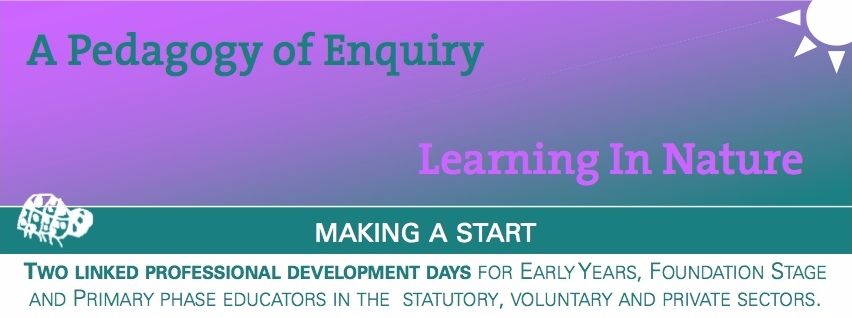
Greenwich University and Oxleas Woods, London
Saturday 13th and Sunday 14th June 2015
DAY ONE £190 * DAY TWO £130 * BOTH DAYS £300
We know that:
- Young children are creative, strong, powerful learners
- Educators and children thrive in creative enabling environments
- Early years and primary educators can be creative, critical and reflective.
However, it is not easy to turn beliefs, values and aspirations into practice: there's often a gap between what we want to do and what actually happens
- External pressures can push educators towards 'delivering' instruction rather than facilitating engaged learning
- Even when we encounter engaged learning, we often don't know where to start in building an appropriate pedagogy and feel disheartened.
Our Developing Environments of Enquiry framework and the related Learning to Learn in Nature context is designed for everybody who wants to resolve these dilemmas.
| The Developing Environments of Enquiry framework is centred on valuing children as competent, sociable, imaginative and expressive learners. It aims to develop a pedagogical approach which focuses on children's fascinations and enquiries using many expressive languages. It is additionally informed by the experiences of colleagues in Reggio Emilia whose early childhood centres are built upon and embody such an approach.
THE FIRST DAY will focus on:
|
Learning to Learn in Nature is about:
THE SECOND DAY is for those who also wish to build their pedagogy from deep experiences in the natural environment. We will focus on practical experience in a local woodland, addressing the sensibilities and practicalities of learning in nature as part of DEoE practice. It is open to participants on the preceding day, to those who have attended previous introductory days, and to settings who are already engaged with us on DEoE work. |
Here are some comments from past course and project participants
The start of the journey of change ... occurred when I attended a project run by Sightlines Initiative, who introduced the importance of co-construction of ideas with the children. The real importance of being totally alert and responsive to the dialogue of the children in our care, working alongside the children using discussion and research and introducing thought provoking provocations. The course sessions filled my mind with possibilities – I felt I had perhaps underestimated the potential of children... I asked the question – do we listen enough to the children, do we allow deep thinking and questioning to occur? I felt that we were too prescriptive and this was stifling the children's thought processes and natural abilities to question and problem solve. ....
We have discovered that taking time to really listen and observe the dialogue between the children in our care and note their fascinations has enabled a more holistic approach to planning and what we provide. We have learnt to think about how we enable discussion and experimentation around these ideas, enabling children to make decisions about what they may need and where this learning may lead.
We constantly reflect on our environment and what it looks like, asking the question, 'does it provoke thought?' staff and the children have changed with this new care and attention to detail and life in the Nursery has become more interesting and fulfilling.
Teri Lowther, Nursery Manager, from Poole DEoE course 2012 (extracts from forthcoming article)
Trusting the children to lead the investigation seemed to come easier to us in the outdoor environment of the woods than indoors in the classroom. When the children found the dead bird, we had no hesitation in letting the children lead the way with their fascination and tenderness towards the creature. Yet at school, we didn't feel as much at ease with the topic. In the classroom, learning is framed and delineated by the school building; by its very walls, doors, chairs and tables. In its way this concrete stuff is symbolic of the framework of the education system. In the woods the visible framework is gone and children, who have already been inducted into the community of school, are suddenly released from its visible constraints. In a similar way, so are we.
Working in nature can help us to disentangle our thoughts and feelings and work out what is important to us, and to our children. When uncovering the meaning of our uncertainty we should take the time to work out in our own minds what part of this 'lack of sure-ness' is a valid pause for reflection and what part is a fear of imagined censure that, far from keeping us on the right track, actually immobilises us and leads us down a wrong one away from our real feelings about what is right and important for our children.
Joanna Hume, reception teacher, in Learning to Learn in Nature: Sightlines Initiative 2014
You can read more about the framework and from many transformative experiences, in our books 'Adventuring in Early Childhood Education', 'Learning to Learn in Nature', the DVD 'The Drama of Sound' and online in the 'Learning' section of our website.
Venues
Day One will be held at Greenwich Unversity, London on their main campus on the River Thames. Day Two will be in Oxleas Woods, a triple SI ancient woodland, also in Greenwich.
Further information
Please email
Here is a pdf flyer to download and share with colleagues.

